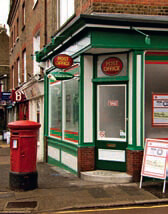Lost in the past
Downton Abbey has become our equivalent of the Super Bowl for showcasing blockbuster TV spots. In this season’s opening episode, it was John Lewis that stole the show with its wistful look at the world of then and now, and the human glue that bonds us together.
Latest to emulate both the choice of launch platform and the big, emotional sell is the Post Office, which recently aired a 60-second spot in front of 10m viewers already moved to a high state of arousal by the story of the dying Sybil.
In the ad, the Post Office claims credit for its role in the special moments of our lives, from kindling new love to reuniting old friends. Perhaps that might have been true in the era in which Downton is set, and letters arrived on time despite the inconvenience of world wars. Today it strains credibility even more than some of the plotlines in the ITV drama.
The most laughable claim in the ad is that the Post Office lowers people’s blood pressure. Well that got me leaning forward. How does that work?
Turns out it’s the place to go when you need a rod licence. At this point I can almost hear the planner’s excited laddering up: ‘Well, so we help people go fishing, right, and that’s kind of a relaxing thing to do, and being relaxed means your blood pressure drops, which is cool. So, hey, we help lower people’s blood pressure.’
Oh no you don’t. You make people’s blood boil. Here’s how it starts: your colleagues over at Royal Mail drop yet another card through my door to say I am out when I’m in. (Well, it saves them carrying the package.)
That then forces me, photo ID in hand, to the no-longer-local but every-bit-as-grotty Post Office, where I spend enough time in the queue to fully ingest the main ‘customer messages’ – how staff must not be verbally abused, and how the counter will close at 2pm prompt on Saturday, irrespective of whether I am still waiting or not.
That direct customer experience, shared by millions, is why those sumptuous production values ring so false. This isn’t John Lewis, with its agreeable stores and nicely turned-out staff. It’s the Post Office. The big ones are horrible and the little ones are found at the back of Londis.
In a May 2012 report, the watchdog Consumer Focus rated the service every bit as ropey as the environment. It concluded that “improvements to service standards are needed”, having found “widespread evidence of inconsistent product advice, consumers being sold incorrect products to meet their needs, and, in a majority of cases, significant problems in correctly completing basic transactions”.
This TV campaign commits one of marketing’s biggest sins: the hubristic laddering up to life’s grand themes, when the underlying product floor is rotten.
The Post Office should take a different kind of lead from John Lewis and strive to match its standards in service, responsiveness, outlets and all-round customer experience. It will take some time. At a guess, I’d say we will be on series 28 of Downton by then.
On 1 March 2012, the Post Office’s computer system went down for the day, leaving customers unable to post parcels or do “anything else that requires a computer”, as explained in a deadpan manner by staff. This was no one-off: in the preceding nine months there were four identical blackout days.
Post Office Locals – counters that offer basic Post Office services within other shops – look set to be the “largest shake-up yet of our Post Office network”, according to Consumer Focus chief executive Mike O’Connor.

Post Office ‘No longer local, but every bit as grotty’
Even though its May 2012 report on the Locals pilot scheme warned that “significant improvements are needed if consumers are to benefit from these”, the Post Office went ahead and started rolling them out this summer.
For those hoping to log on to the Post Office’s website to enquire about any of this, good luck – at the time of going to press, an apologetic message explained that it was “experiencing technical difficulties”.
One of the Post Office’s most royal mess-ups was its renaming to Consignia in 2001. Customers were completely baffled by it – with the exception of visiting Spaniards, for whom it translates perhaps too fittingly as ‘lost luggage’.
